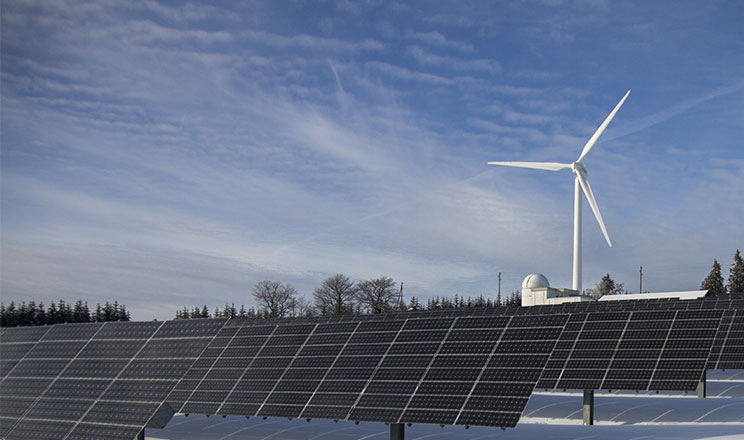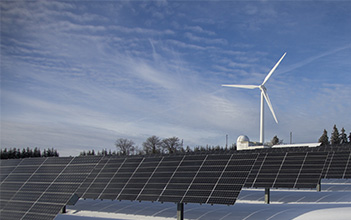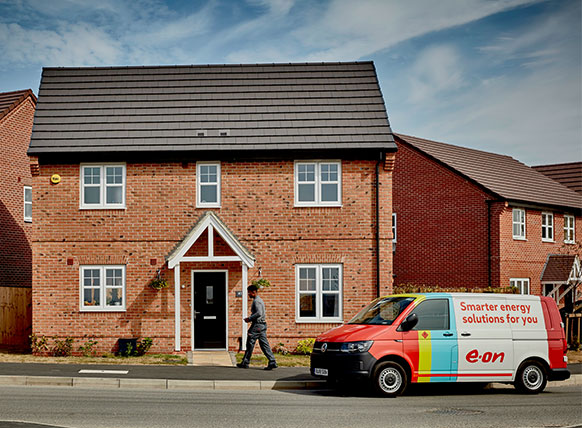A guide to renewable energy
Energy is vital to how we lead our lives, but how often do we think about where it comes from? The electricity we use to power our homes, businesses and cities can either come from renewable sources or fossil fuels.




What is renewable energy?
Renewable energy is generated from infinite, natural resources such as the sun, wind and water or biomass. Powering our homes and businesses with renewable energy brings many advantages. It’s why more and more of the UK’s energy is being generated from renewable sources.
In fact, more electricity was generated in the UK in 2020 from zero carbon emission sources than fossil fuels1 – a record high for renewable electricity generation, and in early June 2020 the UK achieved a significant milestone by going coal-free for two months2.


What are fossil fuels?
Fossil fuels such as coal, oil and natural gas, are a limited, non-renewable resource and have a negative impact on the planet when used to generate power. Since the Industrial Revolution, coal has been a major fuel source used to power the UK. And as recently as 2012, cheap coal still made up more than a third of total electricity generation3.
But burning coal releases harmful gases and pollutants into the air – impacting both air quality and the environment. The good news is that the environmental impact of the UK’s energy production and consumption has shifted towards renewable energy.
What are the types of renewable energy?
There are different sources of renewable energy and here we detail four of the most common types of renewable energy and how they work.
- Solar energy – Generating electricity from sunlight has grown rapidly in popularity, with solar panels now visible on homes and businesses across the UK. Solar panels generate electricity from the power of the sun. They’re made up of smaller solar cells with several layers of semi-conductors and when daylight hits them it creates an electric current which flows through your home or business’ electrical system. And by installing a battery, you can even use the energy generated at night. Read our blog to find out how you could benefit from solar energy.
- Wind power – Wind farms are now a familiar sight in the UK and produce more than a quarter of the UK’s electricity. Either onshore or offshore, wind turbines capture the wind like sails and convert the rotational energy into electrical energy which is then distributed to power our homes and businesses.
- Biomass energy - Biomass energy is generated from burning any organic, renewable material such as wood, plants or household waste to make electricity or heat – like our Blackburn Meadows CHP plant that generates power from locally sourced waste wood that would otherwise go to landfill. And businesses can even use biomass plants to generate their own electricity or to produce steam for use in industrial processes.
- Hydropower - Generating electricity from water is achieved through a hydroelectric plant – water flows spin a turbine to generate electricity4. And the technology keeps on developing – including a wave turbine that captures breaking wave power and protects the shoreline from coastal erosion.
What are the advantages of renewable energy?
1. It has a small carbon footprint
Climate change and the climate emergency is one of the biggest challenges we’re facing globally, and we all need to play our part to help reduce carbon emissions. Renewable energy produces significantly lower greenhouse gases than fossil fuels5 and can help us to tackle the climate crisis.


2. It helps to clear the air
As well as contributing to global carbon emissions, burning fossil fuels releases harmful pollutants into the atmosphere and is a major source of air pollution. Air pollution can bring many health problems, including pneumonia and bronchitis as well as more serious illnesses including heart disease and lung cancer6.
Renewable energy reduces our reliance on fossil fuels and helps us to improve the UK’s air quality and breathe cleaner air.
3. It’s an infinite resource
One of the main benefits of renewable energy is that the sources are constantly replenished – we’ll always have wind, sun and water. By generating electricity from these sources of clean energy, we can help to make sure that we don’t run out of the Earth’s resources and reduce our ability to generate energy as a result – one of the main disadvantages of fossil fuels.
4. It’s cost effective
The cost of generating renewable energy has fallen over recent years and is now considered to be the cheapest source of power, rather than fossil fuels7. And the unprecedented rise in coal and gas prices in 2021 and 2022 has further increased the attractiveness of renewable energy sources7.
What’s more, the cost effectiveness of generating clean energy can boost economic growth8 and by generating your own renewable energy you can even save money on your energy bills.


5. It creates jobs
The growth in renewable energy brings greater demand for green jobs and offers many opportunities - with green jobs typically paying better and facing less risk of automation than non-green jobs9.
Investing in low carbon energy and energy efficiency can create more jobs across the UK than gas or coal generation10. In fact, experts believe that moving to a clean energy future will create more than 10.3 million net new jobs globally.
Working towards a renewable energy future
At E.ON we’re committed to leading the future energy transition. We provide all our E.ON Next customers’ homes with 100% renewable electricity11 and we match the electricity from renewable sources such as wind, solar and biomass.
You can even generate your own renewable energy at home by installing solar panels to power your home and an air source heat pump to keep it warm.
Renewable energy is just the first step to a sustainable home and we’ve got lots of simple tips to help you lead a cleaner life, read one of our other blogs to find out more:
1. The Guardian: UK electricity from renewables outpaces gas and coal power
2. Natural History Museum: Britain goes two months without burning coal amid lockdown
3. Gov.uk: Special feature - Coal in 2012
4. National Geographic: Hydropower, explained
5. National Geographic: Air Pollution
6. Irena: Renewable Power Generation Costs in 2018
7. United Nations Climate Change: Renewable Power Remains Cost-Competitive amid Fossil Fuel Crisis
8. International Renewable Energy Agency: Renewable energy benefits: measuring the economics
9. The London School of Economics and Political Science: Green jobs can pay better and face lower risk of automation than non-green jobs
10. UK Energy Research Centre: Green job creation, quality, and skills: A review of the evidence on low carbon energy
11. Electricity backed by 100% renewable sources. Electricity sourced from E.ON's renewable assets, agreements with independent UK generators and the purchase of renewable electricity certificates. The electricity supplied to your home comes from the National Grid. Find out more at eonenergy.com/renewable
Share to:


Our blog
Read our latest blogs to discover how E.ON is leading the energy transition through smart and sustainable solutions.


Sustainable homes
Find out the many ways in which you can create a more sustainable home and reduce your carbon footprint.


Sustainable businesses
Find out how to turn your business into an industry leader for sustainability.


Sustainable cities and communities
Find out how we're creating smart, sustainable cities and communities across the world.


100% renewable electricity
We believe in a sustainable future, that's why we provide our customers' homes with electricity backed by 100% renewable sources including wind, biomass and solar, with a fixed tariff.


The advantages and disadvantages of solar energy
Solar energy can power our homes, businesses and communities. Discover the pros and cons of solar power and how it works to generate renewable energy.